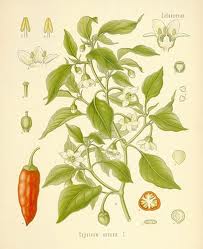King Cayenne

Cayenne (capsicum annum) truly is the king of herbs. Hardly an ailment or serious condition exists that does not benefit from the proper use of cayenne. It is a genuine life saver. I have prescribed cayenne for people more often than any other herbal treatment. If you want to learn herbs, you must first become familiar with cayenne.
"If you master only one herb in your life, master cayenne pepper. It is more powerful than any other." -- Herbalist and Naturopath Dr. Richard Schulze*
I cannot do justice to this powerhouse herb in a few paragraphs. I also do not want to rewrite the vast amount of excellent cayenne information already available, so I intend here to briefly summarize cayenne's abilities and then provide important links for you to study. (Also look on my Library page for book recommendations.) If you take the time to learn cayenne, you will have mastered one of the most potent medicines available.
Medicinal Properties:
- antibacterial
- antipyretic (reduces fever)
- antiseptic (combats pathogens, prevents infection)
- antispasmodic
- astringent (constricting effect)
- blood thinner, cardiovascular tonic
- carminative (relieves GI pain, promotes peristalsis)
- diaphoretic (causes perspiration, increases elimination thru skin)
- hemostatic (stops bleeding)
- hypotensive (reduces blood pressure)
- rubefacient (stimulates blood flow to skin)
- stimulant
- vulnerary (stimulates cell growth, helps heal wounds)
As a fast-acting vasodilator, cayenne has earned a well-deserved reputation as a potent cardiovascular tonic. But to classify cayenne as merely a circulatory agent is to insult this ultra-powerful botanical medicine. Cayenne does indeed improve and increase circulation, but it does so much more! (I can hear a late-night infomercial voice ringing in my head..."But wait, there's MORE!") Cayenne increases blood flow, but cayenne also staunches bleeding. You may be scratching your head at this...but lest I digress into technical herbalist jargon, I will simply describe cayenne as one of the "thinking herbs" or "opposite nature herbs." For now, just think of cayenne not so much as an herb that only increases circulation...think of cayenne as a "blood master." This herb has the ability to properly distribute (to "position," if you will) the blood throughout the body...to put the blood where it is supposed to be. In effect, that is why cayenne lowers blood pressure, can stop a heart attack or stroke, "dissolve" blood clots, but also stop hemorrhaging and bleeding. And cayenne is the herbal medicine par excellence for treating shock. [My husband, who has been attended to various times with my herbal emergency first-aid, after one rather serious wound treatment nicknamed cayenne the "herbal hot poker." Other excellent herbal styptics are available, such as comfrey and plantain, which are not painfully hot in their application...look for future lessons on this topic.]
"In 35 years of practice ... I have never on house calls lost one heart attack patient and the reason is, whenever I go in...if they are still breathing...I pour down them a cup of cayenne tea (a teaspoon of cayenne in a cup of hot water), and within minutes they are up and around." -- Herbalist Extraordinaire Dr. John Christopher**
Cayenne's powerful ability to move blood makes it a natural and healthy stimulant (take a morning cayenne tonic and quit the coffee habit!), as well as an anti-inflammatory and a thermal regulator (wonderful for warming up those cold extremities!). And contrary to reasonable assumption, given cayenne's hot, hot, hot nature, the herb actually relieves pain. Capsaicin, cayenne's primary constituent, blocks pain receptors (it diminishes the activity of Substance P, our bodies' chemical pain messenger), making cayenne effective in external applications for arthritis and other forms of muscle and joint pain.
Cayenne is effective for asthma, is known for healing ulcers, has been shown by Harvard researchers to destroy cancer cells, and lowers serum cholesterol. Cayenne is high in vitamins C and A, and essential minerals such as sulphur, calcium, magnesium and phosphorus. Cayenne boosts immunity and if taken at the onset of a cold/flu, it can prevent the illness from taking hold. (This has worked for us numerous times.)
Cayenne is a catalyst; it causes all other herbs to work better and faster by speeding circulation, enhancing digestion and absorption. This makes cayenne an essential addition to all herbal remedies; cayenne improves the effectiveness of their medicinal action by quickly distributing the herbs' active constituents throughout the body. Cayenne aids digestion by increasing HCL (hydrogen chloride) in the stomach.
Cayenne is also highly nutritious, rich in vitamins C and A, zinc, thiamine, riboflavin, niacin, cobalt, and fiber.
Needless to say, cayenne powder or cayenne tincture should be in everyone's medicine cabinet and first aid kit (a recipe for cayenne tincture is in the link below, "Cayenne for Emergencies"). When using cayenne medicinally, you want to choose the hottest form you can find. The African Bird's Eye pepper is a common variety used by herbalists...its heat rating ranges from 90,000 to 250,000 BTUs. (When creating a cayenne tincture, the dosing would be affected by which HU cayenne you use.)
We all, regardless of our state of health, benefit from taking a morning cayenne tonic. To use cayenne, begin by mixing 1/4 tsp. into some warm water and drinking it (it can be taken with a meal if the heat initially upsets your stomach); you can also add the cayenne to juice, such as orange or tomato. You will likely be surprised at the energy boost you experience with your cayenne tonic. Drinking cayenne powder is a superior and more effective method than swallowing capsules...to understand why, read the link below "Why Cayenne Powder..." Because cayenne is so stimulating, it is best not to take it near bedtime.
Cayenne Info from Shirley's Wellness Cafe
Why Cayenne Powder, not Capsules
-----
